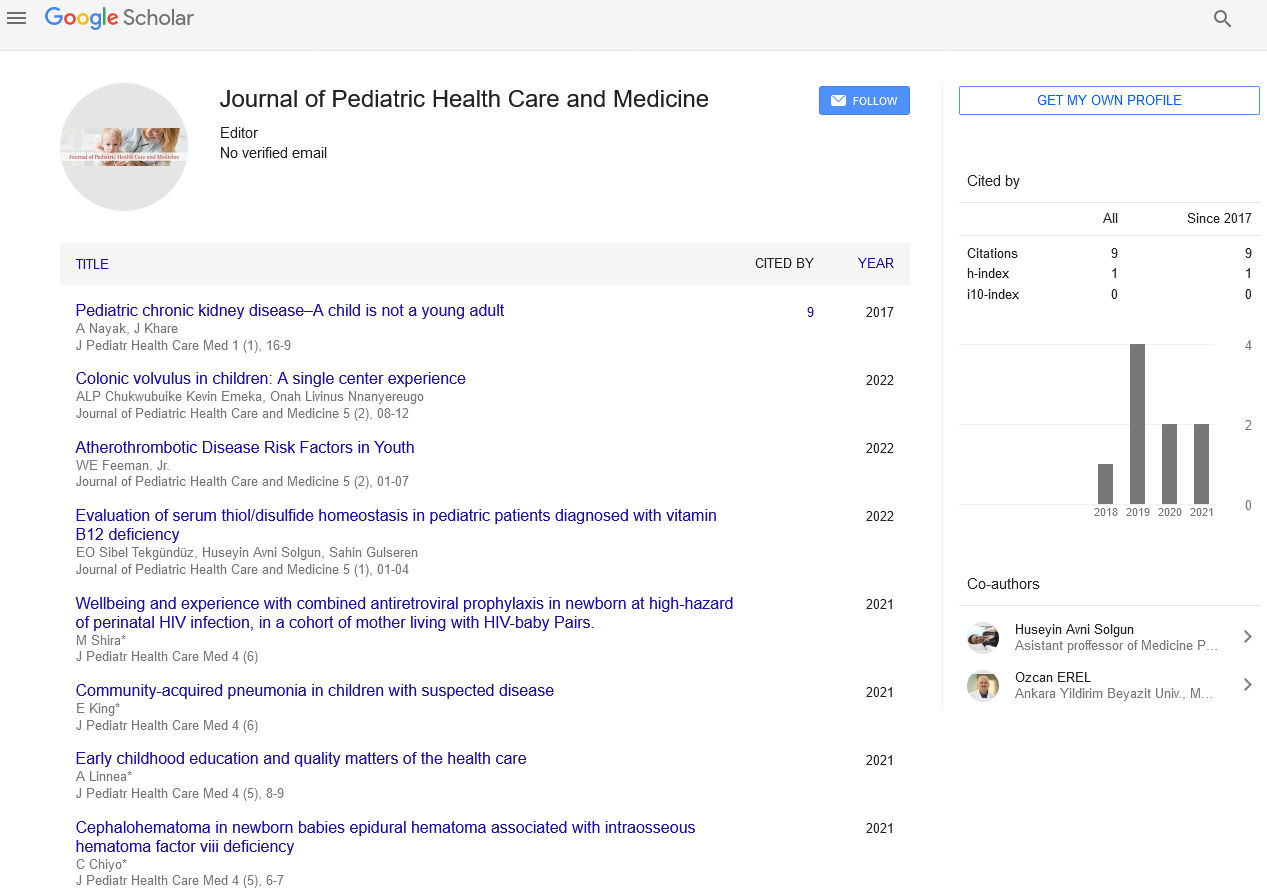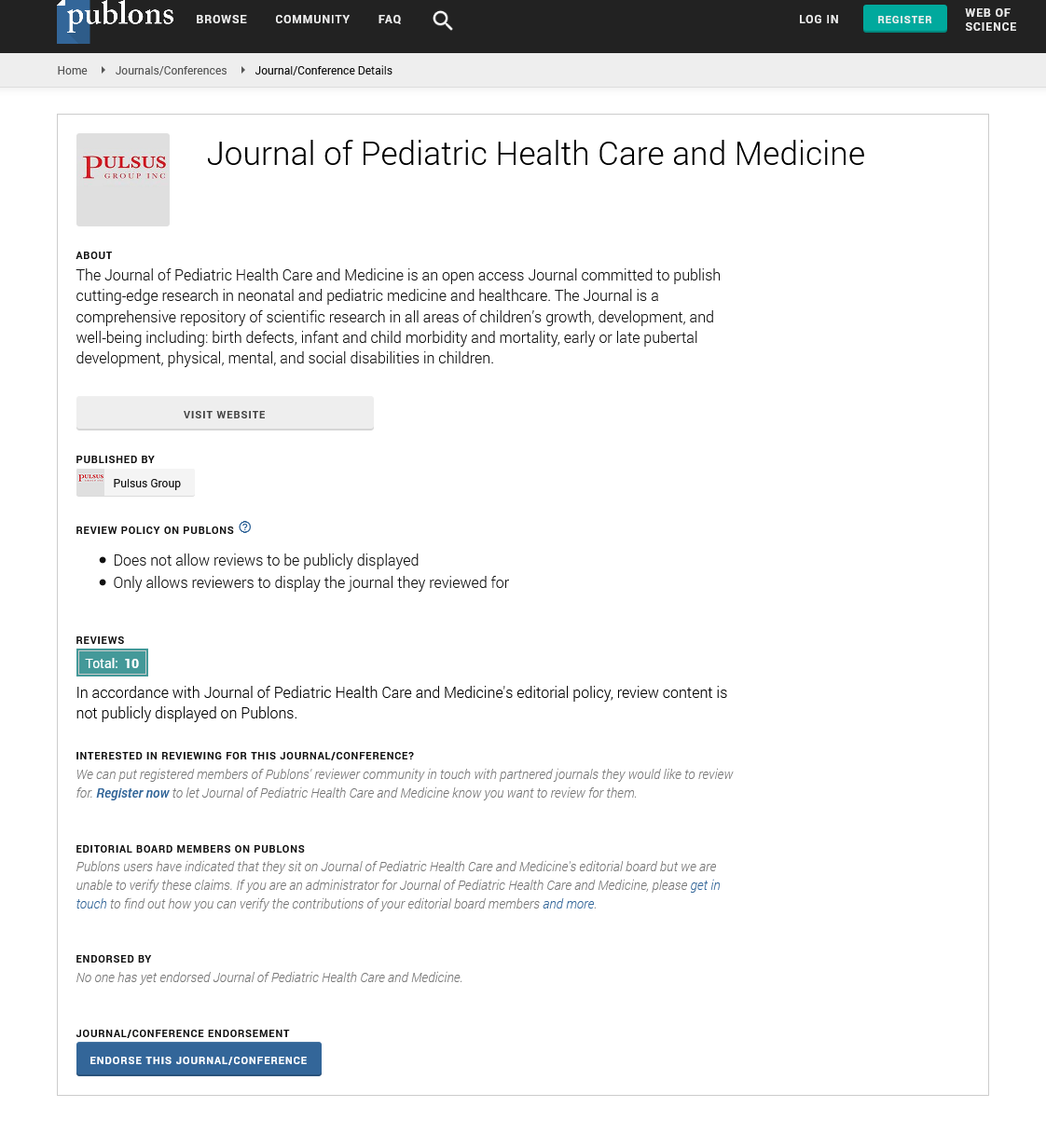Reflections on a niche specialty
Received: 29-May-2018 Accepted Date: Jul 10, 2018; Published: 17-Jul-2018
Citation: Carvalho AM. Reflections on a Niche Specialty. J Pediatr Health Care Med 2018;1(1):22.
This open-access article is distributed under the terms of the Creative Commons Attribution Non-Commercial License (CC BY-NC) (http://creativecommons.org/licenses/by-nc/4.0/), which permits reuse, distribution and reproduction of the article, provided that the original work is properly cited and the reuse is restricted to noncommercial purposes. For commercial reuse, contact reprints@pulsus.com
Perspective
In our fourth year of medical school, we were given the opportunity to complete an elective in nephrology at the Royal Children’s Hospital in Melbourne, Australia. This specialty was intriguing, as the pediatric population is unique and has many facets requiring consideration. Also, although renal physiology is intricate and beautiful, it is complex and can be quite daunting. Accordingly, the combination of the two requires a large measure of devotion, as well as proficiency, which we quickly recognized in the specialists in the field. The first thing that struck us about pediatric nephrology was that, despite being labeled an intensive “niche” specialty, much of what we observed on the renal ward and in clinics at the children’s hospital seemed to transcend routine medical practice. In fact, the doctors spent as much time being mentors and friends to their patients as they did carrying out nephrology-related activities. During the first week, we attended a renal transplant follow-up clinic. After determining that all was well with a young patient’s new kidney, the consultant spent the next forty-five minutes offering advice regarding a bullying issue that was happening to the patient at school and providing assistance to the family. At a pre-transplant clinic the following day, equal time was given to a patient’s suitability as a renal transplant candidate as to her recent adoption from foster care into a family home. It is true that many of these children were already engaging with counseling and social services, but rather than being a waste of time, these impromptu communications with the consultants in the clinics seemed essential to us. The children were visibly comforted and the consultants were also content in the knowledge that they were up to date with the most important issues in the children’s lives.
As we observed the dynamics in the renal ward and clinics between the doctors, the patients, and their families, I realized that the doctors we met during this rotation wore many hats and took on several important duties in caring for patients and their families. While other multidisciplinary professionals, such as social workers, speech and language therapists, educational psychologists, and nutritionists were certainly involved in patient care, the roles of the pediatric nephrologists were far broader than I expected. We observed a consultant arranging transport for a child with an intellectual disability and mobility difficulties to attend a concert given by their favorite artist. On another clinic day, a consultant counseled the young patient and family on social difficulties the patient was experiencing in school. It became apparent to us that no matter how “niche” a discipline is, there are countless common threads that bind the broader specialty of pediatrics together. The theme we saw most often with these practitioners was a holistic approach to the child’s health, encompassing all aspects of physical and mental health in addition to social well-being. We were struck by the family-centered dynamic providing the groundwork for each consultation, and it became apparent that these specialists were providing as much care and attention to the patients’ families as to the patients themselves.
During the elective, we were fortunate to form a relationship with some of the children and their families, as the team spent a significant time with them. The self-sufficiency of the children we met in the Royal Children’s Hospital impressed and inspired us greatly. Many of the children who attended the nephrology clinics had longstanding chronic renal diseases, despite their youth. However, for all their reliance upon their doctors and families, these children exhibited a proficiency and independence beyond their years when it came to managing their renal disease. One child, not yet a teenager, was so knowledgeable about the appropriate nutrition for her renal condition that she was already drafting a kid-friendly renal nutrition cookbook. Other children had learned to become adept at managing their peritoneal dialysis at home. Upon being discharged following an episode of atypical hemolytic uremic syndrome, one previously healthy child rhymed off all the warning signs to look out for that might indicate a relapse and a need to return urgently to the hospital. Children with nephrotic syndrome dutifully weighed themselves daily and recorded the numbers in booklets to bring with them to each clinic appointment. Through our observations of children with chronic renal diseases at the Royal Children’s Hospital, we saw first-hand how important self-sufficiency, education, and family cooperation are to chronic disease management in pediatrics, and we know that this insight will be truly valuable in our medical careers.
Each patient we met at the Royal Children’s Hospital left a mark upon us in some way, but the children who moved us the most were the dialysis patients on the renal transplant list who were waiting for the right match. In Australia, children are prioritized above adults on organ transplant lists, yet some of these children had still been waiting a year or more for a new kidney. Children who faced their own mortality at an impossibly young age was something we saw often at the Royal Children’s Hospital, but we were struck by their optimism, equanimity, and grace while waiting for a transplant that was not certain to come. One child stoically comforted his tearful mother at the nephrology clinic, reassuring her that everything would be all right, after learning that the wait for a renal transplant would be longer than expected. Another child had been matched to a transplant kidney and shared the good news with all of his close family and friends, only to be told later that the new kidney was non-viable for transplant. We silently stood by and watched him absorb this information, aware of the devastation this news could produce. After a few seconds, though, he looked up and said with optimism, “Well, that kidney’s no good, then. I’ll just wait for a better one.” Towards the end of the rotation, we were fortunate to assist with a live-donor kidney transplant involving one of the patients from the nephrology clinic and the family member who was providing the kidney. The donor nephrectomy took place in the morning, followed by examination of the kidney to determine its viability for transplantation. In the afternoon, the kidney was finally placed in the recipient and the entire procedure was deemed a success. We will never forget the child’s happiness and the family’s relief the next morning after learning that everything had gone well and the prognosis was excellent. This experience with a very special family and child made us feel as though we had witnessed a miracle, and indeed we probably had.






